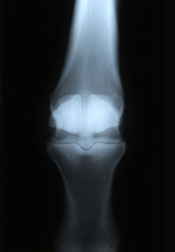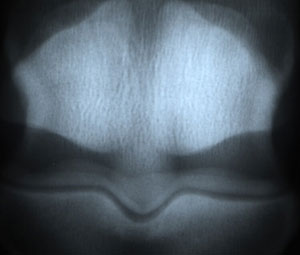4 year old, Standardbred trotter, male, in race training.
History
The horse was referred for scintigraphy after the onset of a 3/5 right hindlimb lameness manifested 15 days previously after racing. No swelling, joint distension or other signs were evident since the onset of the lameness. Ten days before admission, the referring vet performed a low plantar block which almost completely abolished the lameness.
Clinical examination
The horse was lame 3/5 grade on right hind limb when trotted on hand on a straight line. Careful palpation of the limb and hoof test were inconclusive. Flexion of the whole limb and then distal joints significantly worsened the lameness.
Diagnostic imaging
Scintigraphic bone scan showed intense and focused increased radioisotope uptake on the distal part of the right third metatarsal bone with medial parasagittal localization (Fig.1).

Fig.1
Scintigraphic findings were highly suggestive of a bone lesion of the distal articular aspect of the right third metatarsal bone, calling for more accurate special radiographic views. On the dorsal 45° proximal – distal plantar oblique view a thin radiolucent line become evident (Fig.2a,2b).
 Fig.2a
Fig.2a
 Fig.2b
Fig.2b
Diagnosis
Incomplete sagittal fracture of medial condyle of the right third metatarsal bone.
Treatment
Eight weeks stall rest followed by 4 weeks at walk were suggested. Radiographic and scintigraphic control was recommended before resuming training.
Follow up
The trainer reported that the horse was back in training after the suggested period of rest. The horse successfully raced 16 weeks after discharge from the clinic.
